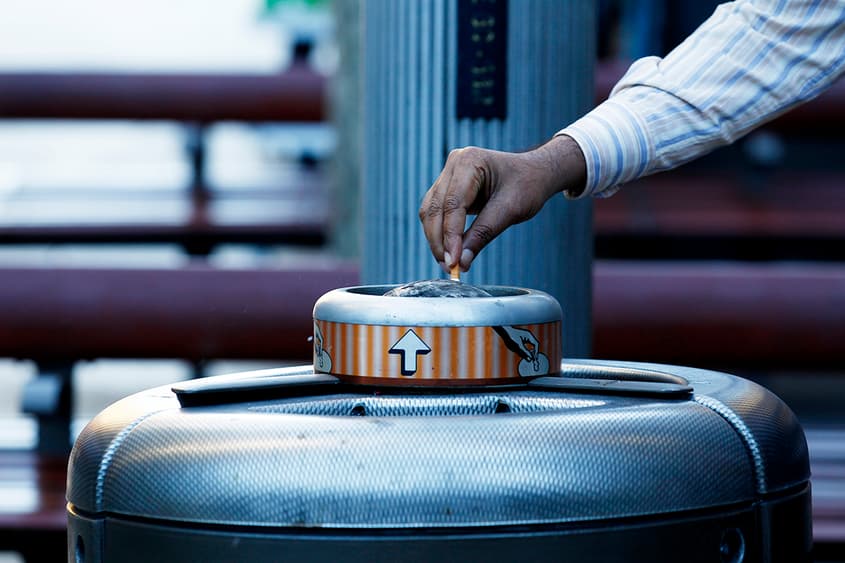There is news this week of police raiding illegal tobacco shops in Sydney. This is an interesting story where the issue is not so much about crime as tax.
Thu 6 Nov 2025 00.00

Photo: AAP Image/Nikki Short
In the May budget, the Government allocated $4.5 million over two years for prosecution activities relating to illicit tobacco compliance and enforcement. This is not something that ever really needed to be done, but it is now because the amount of tax being raised from tobacco excise has dropped dramatically:
This is because the amount that Australians are spending on tobacco has declined at an absolutely astonishing rate:
So does that mean those few Australians still smoking have quit in record numbers? Alas no.
What has happened is that the ABS only counts legal sales of tobacco. So legal sales have fallen off a cliff, but total sales have not.
As the ATO explains:
“The tobacco market includes both legal and illicit tobacco for sale. We estimate that 1,741 tonnes of illicit tobacco was consumed in the 2023-24 year. This represents $3.2 billion of combined customs and excise duty theoretically payable that has been evaded.”
If you add that $3.2bn to the total tobacco excise you get back to a level similar to what was raised in 2022-23.
The problem is not that there has been a drop in excise leading to less tax, but that it has kept going up at a rate that is now getting rather absurd and deterring people from buying legal tobacco.
In 2000, the excise on tobacco was $0.19 a cigarette stick. In today’s dollars that is around $0.40. Now smokes are taxed at $1.40 a stick – a 250% increase in real terms:
That is due to firstly the Rudd Government increasing tobacco excise by 25% in 2010 and then instituting a series of 12.5% increases from 2013 onwards. This has sent the price of tobacco soaring above inflation:
Back in the early 1980s on the TV show Yes Prime Minister the Minister for Health in the program suggested raising the excise on tobacco “until a packet of twenty costs about the same as a bottle of whisky.” In Australia we have reached that point. A pack of what used to be Winfield Reds costs about the same as a 700ml bottle of Johnnie Walker Red Label.
So has this worked?
Yes – clearly excise increases have reduced smoking.
Is it still working?
That is a trickier question.
Smoking is a habit that society would be better if it was totally killed off (I say as an addict now 20 years quit), but the purpose of taxation of tobacco and other activities you wish to deter is to tax to the point that the cost is not so great that avoiding the tax becomes a more attractive activity.
Clearly, we have gone past that point. Yes, there are people who have quit due to the continual increase in excise over the past 4 years, but the marginal impact of tax increases reduces the higher it goes. Essentially, the number of people who will quit due to the price of cigarettes going from $20 a pack to $25 is much more than the number who will quit from it going from $45 to $50.
But also, the price has risen so high that those who continue to be addicted are now seeking other sources. This is not new, but the numbers doing it are.
Back when I smoked, I always knew someone who has able to get “chop-chop” or who got Indonesian cigarettes on the cheap, or who had a mate who was a pilot who was always ready to buy them duty free for you. But most people, like me, just got them legally from a shop. Now you have retires thinking of nothing about getting them from under the counter, as it were.
Tobacco excise clearly has an impact on tobacco use, but if it is driving people to buy illegal smokes, then taxation policy is not doing what it should.
The problem is so great that the ABS is now explaining that it is probably best to use household spending figures that exclude tobacco because of “the rise of illicit tobacco sales over the past few years”
The problem is tobacco companies are using this to campaign for a decline in excise, and let’s be honest tobacco companies are not anyone you should listen to. The data would suggest that reducing the excise back to 2020 levels might undo the loss of revenue and in effect undercut the illegal tobacco sales – but the problem is will it just introduce a price war between legal and illegal smokes? And that brings us back to whatever happens, now that the illegal cigarette genie is fully out of the bottle we need police to launch raids in ways they never had to before. .
That does not mean giving up on reducing smoking.
The UK for example last year followed a policy of New Zealand of banning smoking for anyone born after 2009. This in essence bans anyone under 16 from ever being able to legally take up the habit. Combined with the high cost, that would seem to be an effective way to go about it – but here it requires the states doing the banning.
But the use of ever increasing excises to cut smoking appears to have reached its limit. And it is also worth noting that those who smokes are much more likely to be on low incomes – thus the tax hurts the poorest the most.